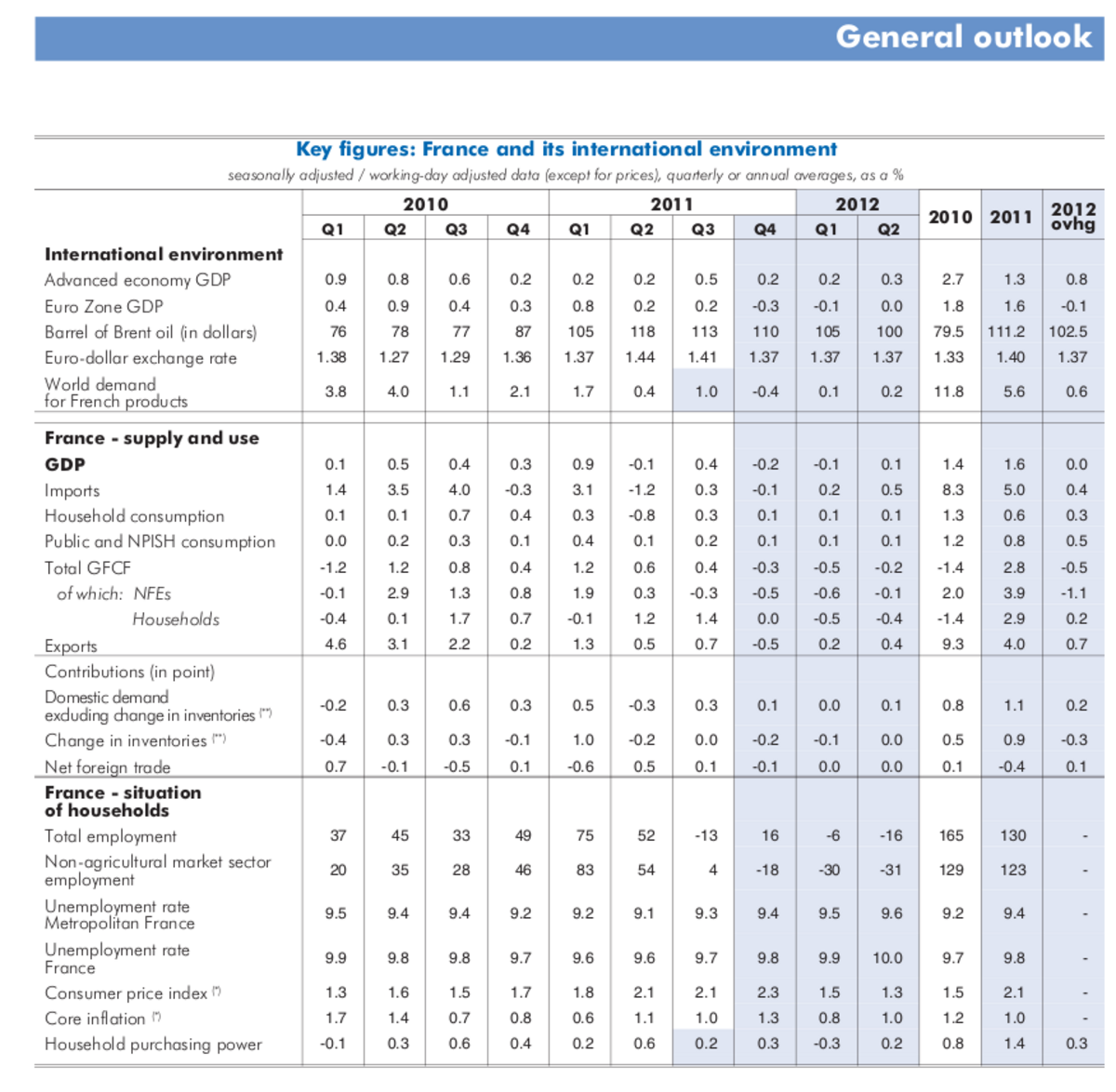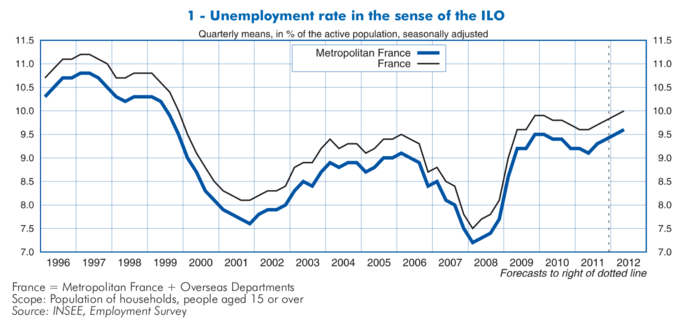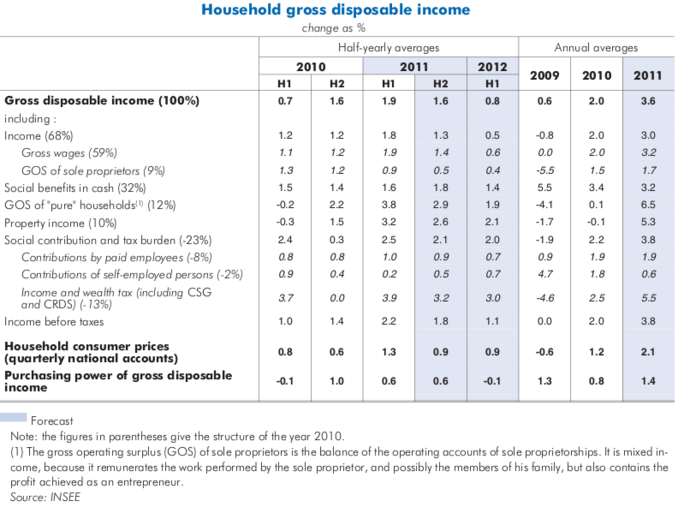Like the rest of the eurozone countries, France is entering a recession, according to the latest quarterly report released this month by the French National Institute for Statistics and Economic Studies (INSEE). Mediapart co-founder Laurent Mauduit argues here why the INSEE report is both an indictment of President Nicolas Sarkozy's economic policies and a warning for the Left opposition, ahead of next year's presidential elections, that austerity measures do nothing but fuel the crisis.
-------------------------
The French National Institute for Statistics and Economic Studies (INSEE) published its latest Quarterly Report, Conjuncture in France, on December 15th, and it makes for solemn reading. It addresses a wake-up call to the whole of Europe as well as to France, for it warns that a recession is thundering down upon us, with all its weight of social misery, while an economic depression has already arrived, with a collapse of employment, falling purchasing power and soaring unemployment.
As an overture to the presidential campaign, with France on the verge of losing the triple-A credit rating it is currently awarded by financial rating agencies, the INSEE report serves as a double warning, both to President Nicolas Sarkozy and all the candidates in next year's French presidential elections [1].
Firstly, for the Right: is it not urgent to suspend economic policies that have driven the whole of Europe, especially France, into a quagmire and which now put it under the tyranny of financial markets and of rating agencies?
Then for the Left, and the Socialist Party in particular: with an economic situation this bad, is it not time to clearly shake off the recessive policies developed in Europe and show a little more daring? Is it not time to call for stronger measures against speculation and to recommend a true strategy for growth?
To sum up the study, INSEE has chosen a euphemistic title: ‘The eurozone marking time'. The truth underlying the figures published by INSEE is actually much clearer than that, for it clearly establishes that the accumulation of austerity plans in all European countries is tipping the continent into a true and straightforward recession.
The report's figures show that the gross domestic product (GDP, used to measure growth) of the eurozone should recede by -0.3% in the last quarter of 2011 before falling another -0.1% in the first quarter of 2012 and is expected to remain flat (0%) in the second quarter.
Economists consider that an economy is in recession when GDP falls for at least two consecutive quarters. The truth, simply, is that in Europe, the recession has begun. It could continue into 2012, and even worsen, because of the ample uncertainties linked to forecasting at this time. Depending on the rhythm at which the rating agencies proceed in the coming weeks, and the pace of continued belt tightening in Europe in the coming months, it is probable that the scenario will be darker than that forecast by INSEE.
-------------------------
1: The first round of voting in the French presidential election is on April 22nd, after which the two highest-scoring candidates will move on to a final, decisive second round on May 6th.
A third austerity plan in the wings
Whatever happens, the consequences for France are dire: the country is already in recession, as shown in the table below, which provides an overview of all of INSEE's forecasts.

Enlargement : Illustration 1

A closer look at the indicators provided by INSEE shows that everything is combining to drag France deeper into recession. GDP is expected to drop by -0.2% in the last quarter of 2011 and again by -0.1% in the first quarter 2012. This, once again, corresponds to the definition of a recession.
It must be noted that for the second quarter of 2012, INSEE doesn't see much of an improvement, only a +0.1% boost. Barely a nudge. If France were to lose its triple-A credit rating and if Prime Minister François Fillon were to announce a third austerity plan - something he has already alluded to by mentioning a revised budget bill, probably in January - then the INSEE forecast will be overly optimistic and in reality the recession will continue.
It is very probable that President Sarkozy, with his will to convince the rating agencies that France is well-managed and that the public deficit is under control, will demand a tighter notch in the belt each time the official growth figure declines - as INSEE's forecast shows it is bound to do.
The government is still clinging to a growth forecast of +1% in 2012. But this is increasingly contested by the major forecasting institutions. In early December, the Organization for Economic Cooperation and Development (OECD) forecast only +0.3% annual growth for France in 2012. But INSEE is even more pessimistic for the second half of next year, with a forecast of zero for the growth overhang [for a definition of this, in English, click here] at the end of June 2012. In other words, growth would have to pick up briskly, at about +0.5% in both the third and fourth quarters in order for the +0.3% annual growth rate predicted by the OECD to be actually achieved.
The government is thus conducting economic policies that put it in an inextricable situation. It is implementing austerity policies that are impeding growth, which in turn deepens the deficit, which leads the rating agencies to brandish the threat of degradation, which pushes the government to adopt new austerity measures. In short, it is feeding a spiral of deflation and recession.
Soaring unemployment, shrinking purchasing power
All of the detailed studies included in the INSEE report show that the French will pay a heavy tribute to austerity. The parts of the report that scrutinise the trends expected in employment, unemployment and purchasing power make for painful reading.
Regarding employment, the forecast is for job losses to continue at a high rate. "All in all, 130,000 market-sector and non-market sector jobs should be created over 2011 and 21,000 jobs are likely to be lost in [the first half of] 2012, " INSEE says [Click here for table]. But given France's demographic trends, unemployment will continue to rise sharply. "Owing to the sharp slowdown forecast for job creations, the unemployment rate should rise in [mainland] Metropolitan France through to mid-2012, up to 9.6% (10.0% including overseas départements)," the report adds.

Enlargement : Illustration 3

"Within the forecasting period, the unemployment rate should increase again due to the deterioration in economic activity and employment. It should come to 9.4% of the active population in Metropolitan France (9.8% including overseas departments) at the end of 2011, then 9.6% in Metropolitan France in mid-2012 (10.0% including overseas departments). In the course of [the second half of] 2011, employment should grow far more slowly than the active population: 20,000 jobs should be created, with 102,000 extra people joining the labour market. In [the first half of] 2012, total employment should drop (-6,000), while the active population is set to continue rising at a sustained rate (+70,000 people)," INSEE notes.
As concerns purchasing power, the table below shows that current trends are similarly alarming.

Enlargement : Illustration 4

In concrete terms, purchasing power (of gross available household income) will rise by +1.4% in 2011. However, it is in a phase of spectacular collapse because it is set to shrink by -0.1% in the first half of 2012. Furthermore, this indicator is misleading because it is not adjusted to include the increase in the number of households which will automatically result from current demographic trends. The rise of +1.4% in 2011 and the fall of -0.1 in the first half of 2012 do not correctly reflect what households are experiencing.
To better appreciate how these trends are really experienced, INSEE calculates a different indicator of purchasing power - the consumption unit. As expected, purchasing power is less robust using this indicator. It will rise only by +0.7% in 2011. INSEE provides no forecast for this indicator for the first half of 2012 but the logical conclusion of its calculations is that purchasing power will contract by -0.5 to -0.6 basis points. All of which is a calamitous result for Nicolas Sarkozy, whose 2007 presidential election campaign slogan presented him as "the president of purchasing power".
Fight austerity or 'give rigour some sense'?
This report must be seen for what it is: a wake-up call, a warning.
INSEE makes it clear that nothing is, as of yet, irretrievable; the trend can be reversed if adequate economic policies are implemented. "This forecast involves an unusually high degree of uncertainty and may be affected by many factors. In particular, against a backdrop of extremely jittery markets, the financial tensions in the eurozone could grow and seize up the world financial system. Conversely, the implementation of measures to restore confidence among economic agents could lead to an upswing in expectations and bring about a more marked rebound in activity in the eurozone and thus France," the report says.
Thus, two important messages emerge from the report. The first is a between-the-lines indictment of the economic policies of Nicolas Sarkozy, who himself laid the groundwork for the recession. He did so with austerity plans and cost-cutting programmes in public spending, and by, in the last five years, refusing all policies to raise the minimum wage as well as by foregoing all measures to bolster consumer spending. The proposed Franco-German treaty that Sarkozy and German Chancellor Angela Merkel want to impose on the whole of Europe, with as keystone, the anti-public deficit rule aimed at perpetuating austerity policies for the long-term and banning recovery strategies, threatens to deepen the recession that has already arrived.
But the warning is just as valid for the Left, and notably for the Socialist Party. The party's candidate, François Hollande, has been sending signals that seem aimed more at financial markets than at his electorate - signs of reinforcing rigour, not to say austerity. First, there was his spectacular turnabout on pension reform. After having supported his own party's proposal to lower the legal retirement age to 60 from 62, Hollande, speaking on RTL radio on December 12th, turned coat on the issue.
But his position regarding the European Treaty defended by Sarkozy and Merkel also raises questions. If elected, will François Hollande renounce the treaty? Or will he simply ask for it to be amended? If the truth be told, his comments on the issue, again on RTL radio on December 12th, are open to both interpretations. "If I am elected President of the Republic, I will renegotiate this accord," he said, adding; "I will make sure that what is lacking will be added, that is to say the intervention of the European Central Bank, Eurobonds, and a financial bailout fund - in other words, what responds to what is today the pressure of the markets".
So does the socialist candidate want to turn his back on austerity policies or just, to use his convoluted slogan that so annoys the other components of the French Left, "give rigour some sense" ("Donner du sens à la rigueur")? The INSEE report has the merit of highlighting the critical importance of this discussion and raises the crucial question of which economic policies are best suited to shaking off recession.
- Laurent Mauduit is one of Mediapart's specialist writers on economics, finance and social affairs. Previously economics editor of French daily Libération, and a senior economics journalist and editorialist with Le Monde, he is a co-founder of Mediapart.
-------------------------
English version: Patricia Brett
(Editing by Graham Tearse)


